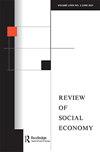知情同意和算法歧视——泄露你的数据是新的弱点吗?
IF 1.6
Q2 ECONOMICS
引用次数: 0
摘要
本文讨论了算法歧视的各种形式和来源。我们特别探讨了乍一看“自愿”分享或出售个人数据与基于大数据和人工智能的自动决策的潜在风险之间的联系。我们认为,在许多情况下,算法驱动的分析或决策机制的实施将不成比例地使某些弱势群体处于不利地位,这些群体已经在许多现有的数据实践中处于不利地位。我们对这些机制的自愿性提出质疑,特别是对某些弱势群体,并声称这些群体的成员通常更有可能泄露他们的数据。如果这些现有的数据化做法加剧了先前的劣势,它们就“加剧了历史的不公正”(Hellman, 2018),从而构成了道德上错误的歧视形式。更糟糕的是,基于从他们身上收集到的额外数据,他们甚至更容易受到进一步的算法歧视。本文章由计算机程序翻译,如有差异,请以英文原文为准。
Informed consent and algorithmic discrimination – is giving away your data the new vulnerable?
This paper discusses various forms and sources of algorithmic discrimination. In particular, we explore the connection between – at first glance – ‘voluntary’ sharing or selling of one’s data on the one hand and potential risks of automated decision-making based on big data and artificial intelligence on the other. We argue that the implementation of algorithm-driven profiling or decision-making mechanisms will, in many cases, disproportionately disadvantage certain vulnerable groups that are already disadvantaged by many existing datafication practices. We call into question the voluntariness of these mechanisms, especially for certain vulnerable groups, and claim that members of such groups are oftentimes more likely to give away their data. If these existing datafication practices exacerbate prior disadvantages, they ‘compound historical injustices’ (Hellman, 2018) and thereby constitute forms of morally wrong discrimination. To make matters worse, they are even more prone to further algorithmic discriminations based on the additional data collected from them.
求助全文
通过发布文献求助,成功后即可免费获取论文全文。
去求助
来源期刊

REVIEW OF SOCIAL ECONOMY
ECONOMICS-
CiteScore
2.60
自引率
10.00%
发文量
18
期刊介绍:
For over sixty-five years, the Review of Social Economy has published high-quality peer-reviewed work on the many relationships between social values and economics. The field of social economics discusses how the economy and social justice relate, and what this implies for economic theory and policy. Papers published range from conceptual work on aligning economic institutions and policies with given ethical principles, to theoretical representations of individual behaviour that allow for both self-interested and "pro-social" motives, and to original empirical work on persistent social issues such as poverty, inequality, and discrimination.
 求助内容:
求助内容: 应助结果提醒方式:
应助结果提醒方式:


